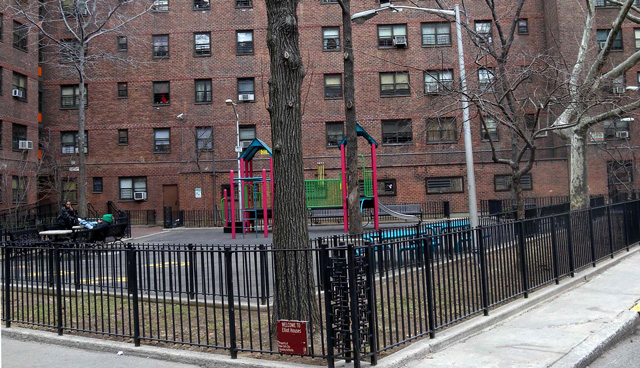By Angela Reyes
West Side public housing residents are dealing with a range of problems in their apartments, including broken water pipes, clogged sinks, electric issues, broken air conditioners and windows, and no hot water. Tenants gathered to discuss these issue December 2, at Fordham University School of Law. Three panelists, Manhattan Borough President Gale Brewer, Nico Palazzo, a staff attorney from non-profit Housing Conservation Coordinators, and Miguel Acevedo, a tenant from Fulton Houses, addressed slow repairs, inadequate funding and poor communication at NYCHA properties.
The city has an affordable housing crisis. Wages have only increased by 15 percent, while the monthly rent in New York City has increased close to 40 percent. Some residents are not able to make ends meet. One in 14 New Yorkers live in NYCHA public housing developments.
The most pressing issue plaguing NYCHA developments is a delay in repairs, said Gale Brewer. In addition to broken plumbing and air-conditioning and heating, often fire alarms don’t work and walls need painting. NYCHA uses a ticket system where tenants call a housing office with a complaint and are given a ticket number. Often maintenance teams take a few days to answer and respond. Brewer said that there is not enough communication between the tenants and NYCHA staff. The ticket system, she said is not effective for quick repairs.

Panel moderator Betsy Eichel asked the panel how they believed Trump presidency is impacting NYCHA residents. Miguel Acevedo said he believes the new administration will make it harder for NYCHA to find money to make repairs for the next 10 years. He said he hopes to see more tenants voting in local elections. “In our city, it is important to be involved in the community and know who your mayor is,” he said. “The mayor is able to make effective changes within the community and wants the residents to acknowledge that.”
There are 600,000 NYCHA residents who can come together and vote for council members and a mayor who believes in public housing, said Acevedo. “Organize a group-association of 10 to 15 people to speak out to elected officials,” he said. He encouraged residents to attend monthly TA meetings to speak about their concerns. He also told tenants to attend legal and community services where they could ask how rent is calculated.
Nico Palazzo agreed and said NYCHA does not always correctly identify a tenant’s income. As a result, tenants have to pay more money in rent each month. Palazzo stressed that tenants should know their rights and that they can address the problem of incorrect income in court.
Tenants enroll in lotteries at locations where they would like to live. However, sometimes they are put in neighborhoods they did not request. Some West Side tenants are put into building across the street from expensive buildings. The residents who pay a lot of money in rent complain about the tenants because the 20-story buildings are blocking their view. NYCHA often has difficulty getting community sign-off on new buildings as many New Yorkers resist the public housing towers which blocks views.
Acevedo said that the tenants in the Fulton houses had considerable success getting repair done because of clear communication. Getting things done, he said, starts with the tenants coming together and make a stand.



